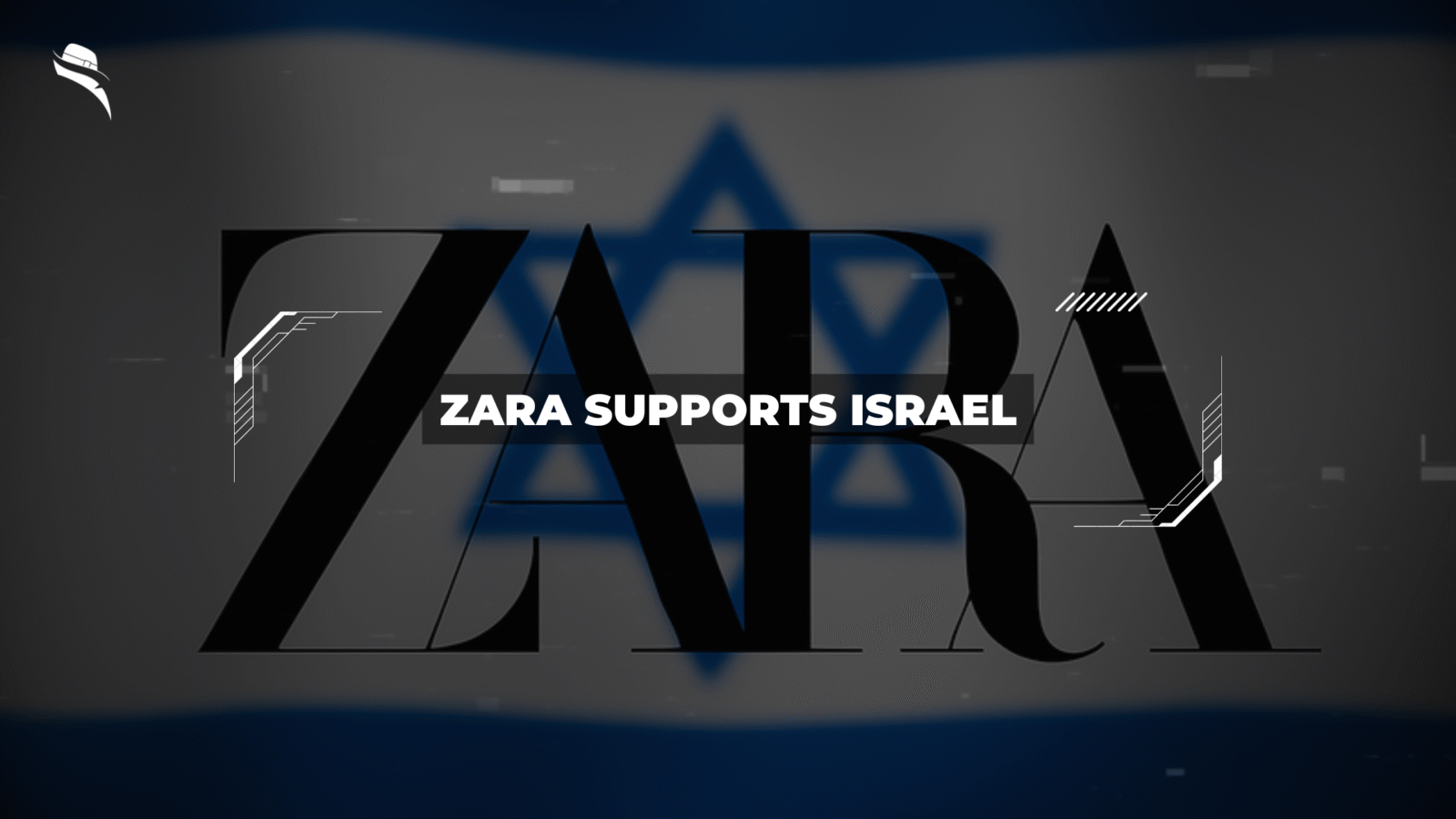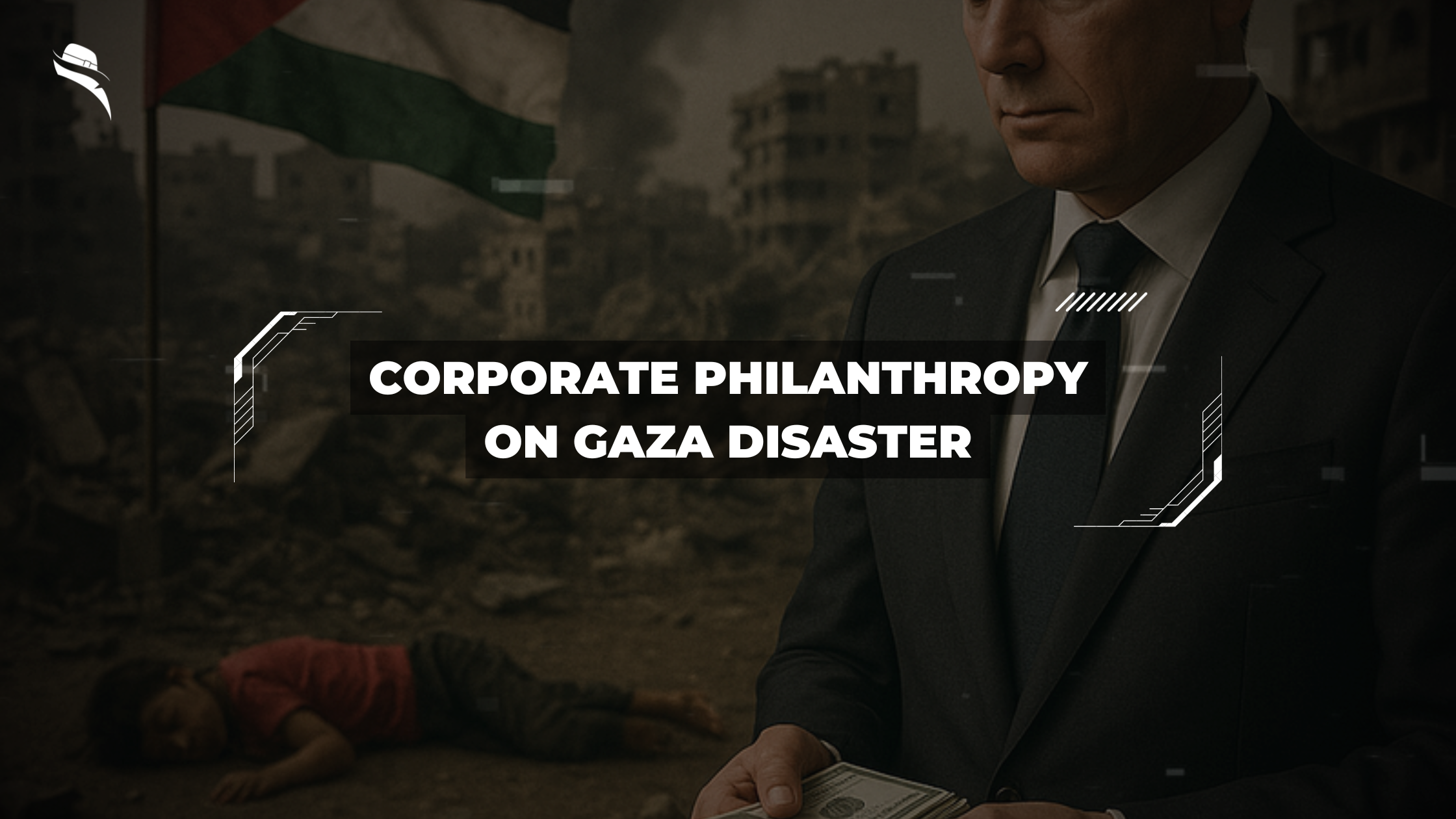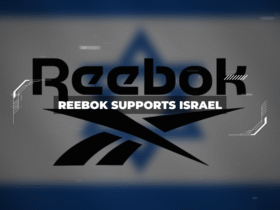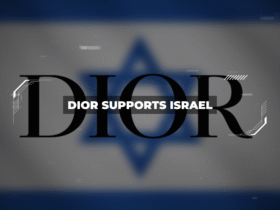Zara supports Israel through multiple business decisions that have sparked international outrage. Recently, the fashion retail giant removed a controversial advertising campaign from its website after pro-Palestine activists called for a boycott of the brand. This controversy emerged amid Israel’s ongoing military operations in Gaza, where Palestinian authorities report more than 18,000 people have been killed, mostly women and children.
The clothing retailer’s connection with Israel extends beyond advertising missteps. At the beginning of 2025, while the conflict continued, Zara opened its largest-ever store in Israel—a 4,500 m² flagship near Tel Aviv. Following this expansion, the Zara boycott movement gained significant momentum, with #BoycottZara trending on the messaging platform X. Additionally, Britain’s Advertising Standards Authority received 110 complaints about the retailer’s campaign. The Zara controversy has intensified as consumers increasingly question the brand’s position on the conflict, especially considering that the Israel Defense Forces have struck more than 22,000 targets in Gaza.
This article examines the multifaceted relationship between Zara and Israel, exploring the company’s business decisions, political connections, and advertising scandals that have fueled public backlash worldwide.
Zara’s Business Expansion in Israel Amid Conflict
Amid ongoing hostilities in the Gaza region, Zara’s business decisions in Israel have drawn significant attention. The brand has maintained and even expanded its footprint in the Israeli market, raising questions about corporate responsibility during times of conflict.
Opening of the flagship store during the Gaza war
In early 2025, Zara inaugurated its most ambitious retail project in Israel to date. The Spanish fashion giant unveiled a massive 4,500 m² flagship store near Tel Aviv, marking its largest retail space in the country. The timing of this grand opening coincided with the intensification of military operations in Gaza, creating a stark contrast between retail expansion and humanitarian crisis.
The strategic decision to proceed with the store launch despite the regional turmoil raised eyebrows among international observers. Furthermore, the scale and prominence of this flagship location suggested a significant investment and long-term commitment to the Israeli market, regardless of the political climate.
Economic ties with the Israeli market
Zara’s parent company, Inditex, has cultivated substantial economic relationships within Israel over several years. These connections extend beyond mere retail presence to include supply chain partnerships and distribution networks throughout the country. Their business model in Israel follows the same franchise arrangement used in many international markets.
The economic benefits flow both ways—Israeli consumers gain access to global fashion trends, while Zara secures a foothold in a relatively affluent Middle Eastern market. Nevertheless, these commercial considerations appear to have taken precedence over potential reputational risks associated with expanding during a period of intense conflict.
Public perception of Zara’s timing and intent
The juxtaposition of retail celebration against the backdrop of war has shaped public opinion about Zara’s priorities. Many consumers worldwide have interpreted the flagship opening as tacit support for Israel’s position in the conflict. Conversely, others view it simply as business continuity unrelated to political matters.
This perception issue has fueled the broader controversy surrounding the brand. In fact, the hashtag #BoycottZara gained substantial traction precisely because many consumers connected the dots between Zara’s business expansion and what they perceived as political alignment with Israel during a contentious time.
Political Events and Endorsements Linked to Zara
Beyond retail operations, Zara has faced intense scrutiny over its political connections in Israel. The relationship between fashion and politics became particularly evident through actions that many observers view as a tacit endorsement of controversial positions.
Franchisee’s support for far-right Israeli figures
The controversy intensified in October 2022 when Joey Schwebel, chairman of Trimera Brands (Zara’s Israeli franchisee), hosted a campaign event at his home for ultranationalist politician Itamar Ben-Gvir. This association proved highly contentious as Ben-Gvir is known for his extreme right-wing views, including openly calling for the expulsion of Palestinians.
After the event, Ben-Gvir himself publicly praised the brand, tweeting: “Zara, beautiful clothes, beautiful Israelis”. This endorsement further cemented the perception of alignment between the fashion retailer and controversial political figures. Notably, Ben-Gvir has been indicted 53 times for various violations, including racial incitement.
Impact of political affiliations on brand neutrality
The political association triggered immediate backlash. Some Israelis posted videos showing themselves burning Zara garments. Even Israel’s Transportation Minister Merav Michaeli announced she would no longer shop at Zara due to the event.
Additionally, in Rahat, an Arab-majority town in southern Israel, Mayor Fayez Abu Souhaiban condemned Zara in a video where he set a Zara item ablaze, stating: “We have to burn these clothes, and I call on fellow citizens to boycott this company”.
Zara’s silence on controversial political ties
Though faced with mounting criticism, Zara’s response was notably minimal. When questioned about the event, Schwebel declined to comment, stating only: “We do not refer to personal issues of the family”. Meanwhile, Zara headquarters issued what critics described as “a weak public statement” distancing itself from the remarks, but took “no meaningful action or accountability”.
This reluctance to address political associations has subsequently fueled broader questions about corporate responsibility in conflict zones.
The Advertising Scandal: Missteps and Misinterpretations
Fashion retail giant Zara faced another significant challenge when its advertising campaign titled “The Jacket” ignited worldwide outrage. This controversy further complicated questions about whether Zara supports Israel through its business decisions.
Imagery resembling Gaza war casualties
In December 2023, Zara released a campaign featuring model Kristen McMenamy surrounded by mannequins wrapped in white shrouds and broken statues. Several images showed McMenamy holding what appeared to be a mannequin wrapped in white cloth, which critics said resembled Palestinians carrying their dead loved ones in white body bags. Other photos displayed mannequins with missing limbs and scenes with white powder sprinkled on floors amid broken plasterboard.
Public complaints and ASA involvement
The campaign sparked immediate backlash across social media platforms, with #BoycottZara trending on X (formerly Twitter). Britain’s Advertising Standards Authority received 110 complaints about the retailer’s campaign, with complainants arguing the imagery referenced the Israel-Hamas conflict and was offensive. Consequently, protesters gathered outside Zara stores in Tunisia and Germany, with some demonstrators carrying props simulating dead children in white body bags.
Zara’s explanation and removal of the campaign
Initially, Zara defended the campaign, stating it was conceived in July and photographed in September 2023, before the October 7 Hamas attack on Israel. According to the company, the campaign presented “unfinished sculptures in a sculptor’s studio” created for “the sole purpose of showcasing craftmade garments in an artistic context”. Nevertheless, Zara eventually removed the campaign, acknowledging that “some customers felt offended by these images”.
Criticism of Zara’s lack of cultural sensitivity
Critics accused Zara of failing to take accountability and instead attempting to defer blame by emphasizing the campaign’s pre-conflict creation. Significantly, this controversy followed earlier incidents, including when Zara’s head designer made anti-Palestinian comments in 2021. Consumer advocates pointed out that Zara’s response lacked authenticity, appearing insufficient to address public concerns about cultural insensitivity.
Global Reactions and the Rise of #BoycottZara
The controversy surrounding Zara escalated rapidly as social media platforms became battlegrounds for public opinion on the retailer’s perceived Israeli connections.
Social media trends and influencer responses
On Instagram, TikTok, and X, calls to boycott Zara spread virally. Britain’s Advertising Standards Authority received 110 complaints about the retailer’s campaign. Protesters gathered outside Zara stores in Tunisia’s capital, with demonstrators waving Palestinian flags and splattering display windows with red paint.
BDS movement’s strategic targeting of Zara
Recently, the Palestinian BDS National Committee officially endorsed the grassroots campaign against Zara, citing its “deep and growing complicity in Israel’s regime of settler-colonialism, apartheid, and genocide”. The movement specifically condemned Zara’s January 2025 flagship store opening near Tel Aviv amid the ongoing conflict.
Consumer activism and ethical fashion choices
Many consumers now view Zara through an ethical lens. According to one study, 71% of shoppers prefer brands that align with their values. This shift toward conscious consumerism has affected other fast-fashion retailers similarly labeled “Not Good Enough” for environmental and labor practices.
Zara’s past controversies are fueling the current outrage
Previous incidents have intensified the current backlash. In 2021, Zara’s chief women’s designer sent inflammatory messages to Palestinian model Qaher Harhash. In 2022, boycott calls emerged after Zara’s Israeli franchisee hosted far-right politician Itamar Ben-Gvir.
Legal risks for companies complicit in human rights violations
Corporate executives face potential legal accountability for complicity in human rights violations. A legal analysis warns companies risk complicity “even just by carrying out business activities” in regions experiencing severe human rights abuses.
We’ve covered multiple fashion labels with ties to Israel. To view the full set of case studies, visit our main guide: Fashion Brands That Support Israel.
Final Thoughts
The saga of Zara’s relationship with Israel illuminates broader challenges facing global brands in politically charged environments. After public backlash, Zara eventually acknowledged that “unfortunately, some customers felt offended by these images” and expressed regret over the “misunderstanding”. The company reaffirmed its “deep respect towards everyone”.
This episode highlights the delicate balancing act required of international corporations. As Britain’s Advertising Standards Authority received 116 complaints about a similar controversy involving M&S, it’s evident that brands now operate under intense scrutiny.
The reaction to Zara’s campaign demonstrates “the heightened sensitivity international brands are navigating as fighting across Gaza intensifies”. Indeed, the fashion giant became “the first major Western brand to take such a drastic step after criticism for what some saw as insensitive advertising”.
Ultimately, this situation serves as “a testament to the power of crisis PR”. Crisis management experts point out that “a well-planned crisis response can allow a company to weather controversy and come out stronger,” whereas poor planning “can cause massive damage to the organization’s reputation”.
For corporations operating globally, the key lessons remain clear: respond quickly, take accountability, and most importantly, avoid repeating past mistakes.
FAQs
Why is Zara accused of supporting Israel?
Zara is accused of supporting Israel because of its continued business expansion in the country, including opening its largest-ever flagship store near Tel Aviv in January 2025 during Israel’s war in Gaza. Activists argue this reflects complicity with Israel amid a humanitarian crisis.
What was the Zara advertising scandal about?
In December 2023, Zara launched an ad campaign featuring mannequins wrapped in white shrouds and broken statues. Critics said the imagery resembled Gaza war casualties. After widespread backlash and over 110 complaints to Britain’s Advertising Standards Authority, Zara removed the campaign.
How is Zara connected to far-right Israeli politicians?
In October 2022, Joey Schwebel, chairman of Trimera Brands (Zara’s Israeli franchisee), hosted a campaign event for far-right politician Itamar Ben-Gvir. Ben-Gvir, known for racist and ultranationalist views, publicly praised Zara afterward, fueling accusations of political alignment.
What was the public reaction to Zara’s controversies?
Public backlash has been global. Hashtags like #BoycottZara trended on social media, protests were staged outside Zara stores in Europe and North Africa, and some Israeli and Palestinian leaders called for boycotts. Even Israeli officials and citizens burned Zara clothing in protest.
Did Zara respond to the accusations?
Zara removed the controversial ad campaign but insisted it was conceived before the Gaza war and was meant to show “unfinished sculptures.” Critics say the response lacked accountability. Regarding political links, Zara’s headquarters issued only minimal distancing statements.
Has the BDS movement targeted Zara?
Yes. The Palestinian-led Boycott, Divestment, Sanctions (BDS) movement officially endorsed the #BoycottZara campaign, calling the brand “deeply complicit in Israel’s apartheid and settler-colonial regime.” BDS has urged consumers worldwide to avoid shopping at Zara.
How significant is Zara’s business presence in Israel?
Zara operates through franchise agreements in Israel and, as of 2025, opened its largest store in the country (4,500 m²). This expansion during the Gaza conflict has been viewed as prioritizing profit over ethics.
What role did consumer activism play in the Zara boycott?
Social media campaigns, protests, and influencer involvement amplified calls to boycott Zara. Studies show most consumers prefer ethical brands, and many shifted away from Zara due to concerns over political ties, labor practices, and cultural insensitivity.
Has Zara faced similar controversies before?
Yes. In 2021, Zara’s head designer made anti-Palestinian remarks to model Qaher Harhash, and in 2022, the franchisee’s ties to Itamar Ben-Gvir caused backlash. These past controversies intensified the latest outrage.
What are the broader implications of the Zara-Israel controversy?
The case highlights risks for global brands operating in politically sensitive regions. Failure to respond quickly and responsibly can fuel boycotts, damage brand reputation, and invite scrutiny from human rights organizations and regulators.







Leave a Reply